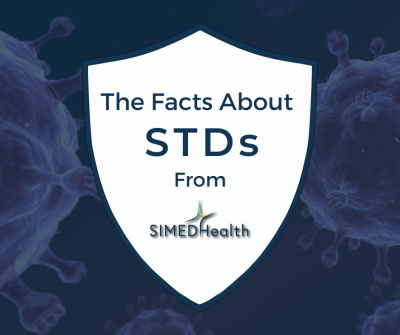
The Facts About Sexually Transmitted Diseases From SIMEDHealth
Sexually transmitted diseases (STDs) continue to be a major health concern. These infections are caused by bacteria, viruses, or parasites transmitted through sexual contact. While some STDs can be easily treated with antibiotics, others may have more serious consequences, such as infertility, organ damage, cancer, or even death. "Some of the health complications that arise from STDs include pelvic inflammatory disease, infertility, tubal or ectopic pregnancy, cervical cancer, and perinatal or congenital infections in infants born to infected mothers", reports the National Insititues of Health. By educating ourselves and taking preventative measures, we can help reduce the spread of STDs and protect our sexual health. If you're sexually active and concerned about your sexual health, don't hesitate to visit SIMEDHealth's Urgent Care or Womens' Health clinics for STD testing. Our experienced healthcare professionals are here to provide you with confidential and compassionate care in a safe and comfortable environment.
1. What are the more common STDs people have risk of contracting?
The common STDs haven’t changed much over the years. They remain gonorrhea, herpes, chlamydia, condyloma, syphilis, hepatitis and HIV.
2. What are the symptoms for the more common STDs?
An unusual discharge from the vagina, penis or anus; discomfort when urinating; lumps, skin growths, blisters or ulcers in the groin area; itching in the genitals area or anus; or skin rash.
3. How can someone find out they have an STD?
The first step is to consider it as a possibility if sexual contact has occurred without protection. A visit with their primary care, urgent care, or health department provider can evaluate and test as indicated based on symptoms, physical findings and exposure.
4. Is STD testing recommended for people without symptoms?
Yes, it is common for people to have STD’s and be able to spread them without having symptoms. Those who have had unprotected sexual contact should consider being evaluated and tested for STDs.
5. How can someone protect their sexual health?
The most effective way to prevent STDs is through abstinence. Abstinence is not likely for the vast majority of the population, so reducing the number of sexual partners is helpful, or a trusted, mutual monogamous relationship can be very effective. Vaccination against Hepatitis B and human papilloma virus (HPV) have been shown to provide high levels of protection against these transmissible viruses. And, using a male latex condom every time there is vaginal, oral or anal penetration has been shown to reduce STD risks.
https://www.niaid.nih.gov/diseases-conditions/sexually-transmitted-diseases